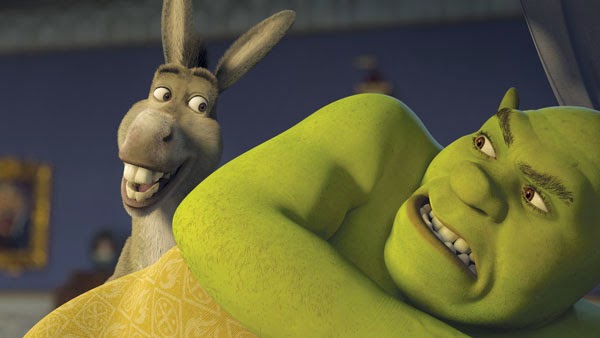The worst possible thing we can do as moviegoers is expect too much from a film that promises so little, but that’s exactly the case with “Blood: The Last Vampire,” the latest in a string of Japanese Anime releases from Manga Video. It’s not that we want the movie to be a better one; just a longer, more productive one. It offers one of the most well-mounted buildups seen in animation of recent memory, taking us through a fascinating story in which the plot twists are so unforeseen that your eyes sparkle with delight after they are carried out. But in the wake of an astounding battle scene that literally sweeps the breath out of its viewers, the end credits begin to roll, and we’re left wondering, “that’s it? Where’s the rest?” A premise is set up, the characters are introduced, the plot thickens, there’s a magnificent battle of forces, and then... nothing. It’s as if the filmmakers created an open wound and felt that audiences didn’t need to see it heal.
Saturday, September 29, 2001
Bubble Boy / zero stars (2001)
Comedy has taught us that one man’s laugh is another man’s disgust, and that thought needs no further explanation beyond the background story surrounding “Bubble Boy,” a movie about a 16-year-old teen with immune deficiency who seeks romance, but is unable to live outside of a plastic bubble for fear of coming in contact with germs which, ultimately, could lead to fatality. Even before its release, the movie was challenged by the mother of a now-deceased son that suffered from the same illness, who feared that such an approach to comedy was unsuitable and defamed the memory of her child. An understandable response? Perhaps. However, having not seen the movie, Carol Ann Demaret, the mother of the original “bubble boy,” has jumped to a conclusion simply on the basis of her personal experience, not to mention the fact that her uproar has actually given the movie more publicity than it ever needed.
The Fast and the Furious / *** (2001)
“The Fast And The Furious” can easily be seen as companion piece to last year’s summer hit “Gone In Sixty Seconds,” and understandably so. Both movies deal with man’s love for automobiles, and not just any automobiles, but fast ones that screech when the brakes are used and survive most of the damage dealt to them. A list of similarities could easily go on in a discussion about both films, but one substantial difference here is that the earlier endeavor was weakened by its dreary cast, whereas this picture, at least, is blessed to have Vin Diesel among its credits. Diesel has easily proven he can turn any role into something meaningful and realistic even when seemingly impossible, and though his character in this picture is hardly someone you would walk with in downtown L.A. past midnight, he’s very much observant, and by the time the plot sets itself up, we actually care what happens to him.
Glitter / * (2001)
Ever notice how famous music artists tend to have the most difficult time paving their ways into a successful movie career? The often disastrous transition that everyone is familiar with—from the examples set by Madonna, Whitney Houston and even the late Alliyah—is repeated for a zillionth time in Vondie Curtis-Hall’s “Glitter,” a film that gives pop songstress Mariah Carey 105 long minutes to show us if she is capable of holding the attention of an audience past her very extensive vocal abilities. Not surprisingly, her efforts have led to one of the most pointless and lackluster efforts to hit the big screen this year.
Hardball / *1/2 (2001)
“Hardball” is exactly the kind of idiotic, boring and sluggish endeavor any number of us would come to expect from director Brian Robbins, the man who single-handedly concocted the moron comedy “Ready to Rumble,” the insulting “Varsity Blues” and the pointless dreck known as “Good Burger” all in less than five years. Perhaps we should give him credit for at least trying though; this is probably a better movie than all three of those put together. And yet you can’t help but wonder, with or without answers, if his mind was simply lost in orbit when he even considered taking on this obvious and predictable project, especially since we’ve already seen it played out a good two or three dozen times in the last twenty years alone. At this point, it’s safe to say that this genre has gone into too many extra innings.
Planet of the Apes / *1/2 (2001)
The primate-infested landscape that is implemented in Tim Burton’s remake of “Planet of the Apes” is not the kind that made the original science fiction endeavor an astounding piece of work, but one of clouded judgment and disconnected logic that is driven by intricate visuals, but slowly and painfully slaughtered by a routine and uninteresting plot and characters that, unless under the ape makeup, seem to drift off into cliché-land. The movie is pointless, dimwitted, clumsy and implausible, and if it doesn’t go down as the single worst picture to come out of Burton’s imagination, it will forever be remembered as one of the most unforgivable remakes I’ve ever seen.
Shrek / **** (2001)
Hollywood’s newfound ability to create movies completely through computers has given birth to one of the most unlikely and diverse movie genres we have ever seen, a form of expression mainly aimed at catching the eye of technology fans, yet also responsible for garnering a young audience for its likeness to standard animation. Whether that resemblance was an intentional move on the parts of studios who first jumped at the technique is something we will never know for sure. For years prior to the evolution of cinematic technology, it had been a heavily-discussed topic regarding the future of the moviemaking process, essentially founded on the notion that the eventual benefits of it would allow studios to create films that seemed so close to standard live action, there would no longer be a need for actors and, thus, large movie budgets. But those claims appear to be founded on naive idealism; the computer is as powerful as we never imagined, and it is still too early to successfully replicate the realism of living, breathing actors. That doesn’t mean it can’t eventually be done, but it leaves many wondering what studios can do in the meantime.
Wednesday, September 26, 2001
Fall 2001: Things to Come
Stepping out of the summer for most vacationers is like leaving behind an endless party, but for many of the moviegoers of the 2001 summer releases, walking away from a train wreck would be a more appropriate comparison. Not that the last three months were a total waste, mind you: the variety of things to see at the local multiplex was extremely diverse, ranging from big special effects extravaganzas (“Pearl Harbor”) to hilarious comedies (“American Pie 2”) to ambitious sequels (“Jurassic Park III”) and even to digitally-rendered epics (“Final Fantasy: The Spirits Within”). Unfortunately, the many selections did not always produce glowing results, and at some points even the most avid moviegoers couldn’t help but scratch their heads in disbelief at what big studios had to offer during the busiest time of the year at the movies. Is this a normal reaction? Sometimes. But even just plain badness can exceed the limits, and unlike recent years, summer 2001 saw its fair share of cinematic garbage.
Subscribe to:
Posts (Atom)








